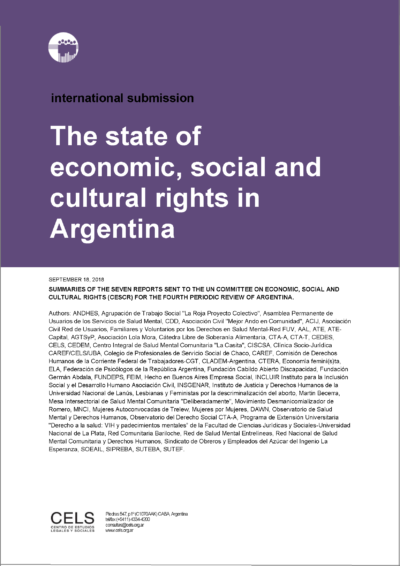Urgent action needed over US threats to the International Criminal Court
US National Security Adviser John Bolton made explicit and concrete threats against ICC judges, prosecutors and personnel if they proceed with an investigation into alleged war crimes committed by US forces in Afghanistan. A group of national and international organizations requested that the UN Assistant Secretary-General for Human Rights take urgent action in response. Our joint letter to him follows.
The state of economic, social and cultural rights in Argentina
Autor/a: Various
10 pgs.
ver más
INCLO welcomes historic win against UK mass surveillance
In a landmark win for seven members of the International Network of Civil Liberties Organizations (INCLO), the European Court of Human Rights ruled that the UK’s mass surveillance practices violate privacy and freedom of expression. CELS joins all its fellow INCLO members in celebrating this victory.
Institutional violence and gender-based violence: A year without Ivana Rosales and another year without reparation
Thirty-five organizations published an open letter demanding that the Argentine state and Neuquén province fulfill the commitment they made to Ivana Rosales before the Inter-American Commission on Human Rights. Her daughter continues to demand justice, a year after Ivana’s death.
Milagro Sala: Supreme Court ordered that Jujuy’s judiciary comply with the Inter-American Court’s provisional measures
In a unanimous ruling, the Argentine Supreme Court enjoined the judiciary of Jujuy province to urgently adopt the measures needed to safeguard the life, personal integrity and health of Milagro Sala, as ordered by the Inter-American Court of Human Rights.
#SomosMillones
The Senate voted to sustain the clandestine nature of abortion in Argentina, after months of massive social mobilizations.
#LetItBeLaw
We call on senators to vote in favor of rights and against clandestine conditions, criminalization and death.
Global Compact for Migration: Progress, shortcomings and the way forward
The new Global Compact represents a turning point in the international management of migration. But much work remains to ensure that its implementation is focused on the protection of the rights of migrants.
Dangerous step toward the militarization of domestic security
The executive branch published a decree that modifies Argentina’s Armed Forces policy. The changes alter the cross-party agreement on the missions assigned to the Armed Forces, forged after the return of democracy and over the following 30 years.
Grave human rights crisis in Nicaragua
The repression of social protest carried out by Nicaraguan security forces and para-police groups has left at least 273 people dead and 1800 injured in the last three months. What started with demonstrations against a pension reform has ballooned into a human rights crisis.
Treating migration as a security problem violates human rights
During the final round of negotiations on the Global Compact for Migration, 40 organizations urged UN member states to ensure that the accord fully incorporate a rights-based approach. The last draft includes changes that reinforce a focus on control and security. If this is validated, countries will have wasted a historic opportunity to fuel a paradigm shift.
IACHR: sexual and reproductive rights & the secular state
Argentina must review legislation that is discriminatory, such as the criminalization of abortion and the lack of access to health care for women who decide to interrupt their pregnancies. The IACHR also put itself at the disposition of states in the region to assist with establishing a clear separation between the secular state and religious beliefs.
Defending Dissent: Report launch at the UN Human Rights Council
Joint research by the International Network of Civil Liberties Organizations (INCLO) and the International Human Rights Clinic of the University of Chicago Law School (IHRC) offers practical guidance on how law enforcement can protect human rights when policing protests.
Response to the US about its withdrawal from the UN Human Rights Council
The US ambassador to the UN said that her country’s decision to abandon the Human Rights Council was partly due to the opposition of 18 organizations to the Council reform proposal backed by Washington. CELS, one of these organizations, responded to her.
#LetItBeLaw
After the lower house passed a bill to legalize the voluntary interruption of pregnancy through week fourteen, 129 votes to 125, we call on senators to vote in favor of human rights and of ending clandestine abortions in Argentina.
Legal abortion: UN bodies give their backing
The Working Group on discrimination against women urged the Argentine state to approve the bill to legalize the voluntary interruption of pregnancy. This is the latest in a series of such recommendations by UN bodies, based on human rights considerations.



